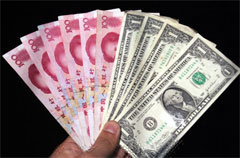| |
|
| |
|
 |
Supply
Chain by the Numbers |
| |
|
| |
- Sept. 22 , 2011
|
| |
|
| |
|
| |
|
| |
Peak Oil - Not so Much; Chinese Economy Stalling;Amazon in Hot Water over Hot DCs; Yuan to Float Sooner than Expected
|
| |
|
| |
| |
| |
|
|
$2.4 million |
Amount on-line retail giant Amazon.com says it has just spent "urgently" installing new air conditioning systems at four US distribution centers, after it was hit this week with charges on the Morning Call web site that it was abusing workers at an Allentown, PA DC in which temperatures regularly soared to 100 degrees or more. It turns out an emergency room doctor in the area called federal regulators in June to report an "unsafe environment" after he treated several Amazon warehouse workers for heat-related problems.
|
| |
| |
|
| |
| |
| |
|

|
The year China is likely to let its currency openly float on world markets, according to a senior Chinese official last week. That would mean calls from the US and Europe for China to let the value of the yuan rise, which they believe is held artificially low by the government to spur exports, would no longer be an issue, as the market would truly set its value, as with other currencies. Western companies need to assess what this might mean in terms of costs coming out of China.
|
| |
| |
| |
|
|
|
| |
 |
 |
| |
|
|
| |